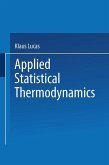For the practical application of thermochemistry to the development and control of tech nical processes, the data for as many substances as possible are needed in conjunction with rapid and simple methods of calculating equilibrium constants, heat balances and the EMF of galvanic cells. For these three types of calculation the following three ther modynamic functions are suitable: The Planck function, the enthalpy and the Gibbs free energy, which are here defined and tabulated as unambigous functions of temperature for pure substances. The first edition of the tables was published in 1973 under the title "Thermochemical Properties of Inorganic Substances". The present supplementary volume contains the data and functions for a further 800 inorganic substances. In addition, the data for about 250 substances from the first volume have been up-dated. These usually small corrections produce better consistency with the data from more recent publications. The comments of users and reviewers of the first volume have largely been concerned with the difference between the present thermodynamic functions and the system used in the JANAF tables, the somewhat unconventional handling of heat balances adopted here, the notation of cell reactions, the description of non-stoichiometric phases and the accuracy of the tabulated data. To answer these questions and criticims the theore tical concepts and the practical use of the tables are dealt with in more detail in the introduction, following the recommendation of some reviewers.
Bitte wählen Sie Ihr Anliegen aus.
Rechnungen
Retourenschein anfordern
Bestellstatus
Storno








